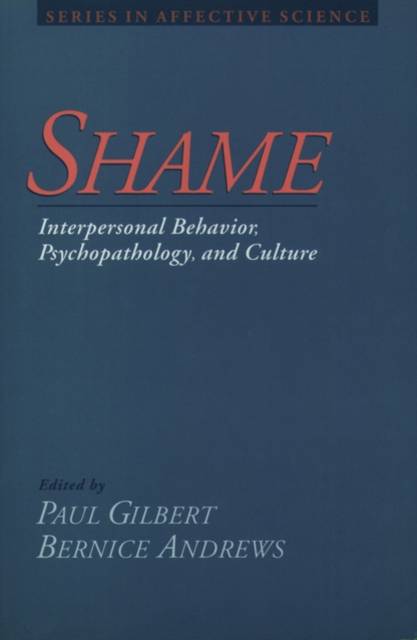
- Retrait gratuit dans votre magasin Club
- 7.000.000 titres dans notre catalogue
- Payer en toute sécurité
- Toujours un magasin près de chez vous
- Retrait gratuit dans votre magasin Club
- 7.000.0000 titres dans notre catalogue
- Payer en toute sécurité
- Toujours un magasin près de chez vous
Description
One of the most commonly reported emotions in people seeking psychotherapy is shame, and this emotion has become the subject of intense research and theory over the last 20 years. In ^IShame: Interpersonal Behavior, Psychopathology, and Culture^R, Paul Gilbert and Bernice Andrews, together with some of the most eminent figures in the field, examine the effect of shame on social behavior, social values, and mental states. The text utilizes a multidisciplinary approach, including perspectives from evolutionary and clinical psychology, neurobiology, sociology, and anthropology. ^L In Part I, the authors cover some of the core issues and current controversies concerning shame. Part II explores the role of shame on the development of the infant brain, its evolution, and the relationship between shame as a personal and interpersonal construct and stigma. Part III examines the connection between shame and psychopathology. Here, authors are concerned with outlining how shame can significantly influence the formation, manifestation, and treatment of psychopathology. Finally, Part IV discusses the notion that shame is not only related to internal experiences but also conveys socially shared information about one's status and standing in the community. ^L ^IShame^R will be essential reading for clinicians, clinical researchers, and social psychologists. With a focus on shame in the context of social behavior, the book will also appeal to a wide range of researchers in the fields of sociology, anthropology, and evolutionary psychology.
Spécifications
Parties prenantes
- Editeur:
Contenu
- Nombre de pages :
- 304
- Langue:
- Anglais
- Collection :
Caractéristiques
- EAN:
- 9780195114805
- Date de parution :
- 27-08-98
- Format:
- Livre broché
- Format numérique:
- Trade paperback (VS)
- Dimensions :
- 155 mm x 234 mm
- Poids :
- 439 g

Les avis
Nous publions uniquement les avis qui respectent les conditions requises. Consultez nos conditions pour les avis.





